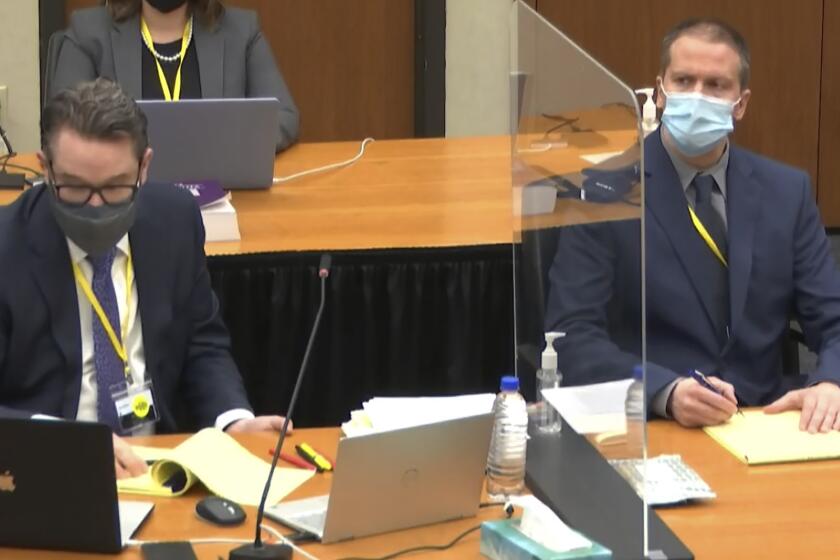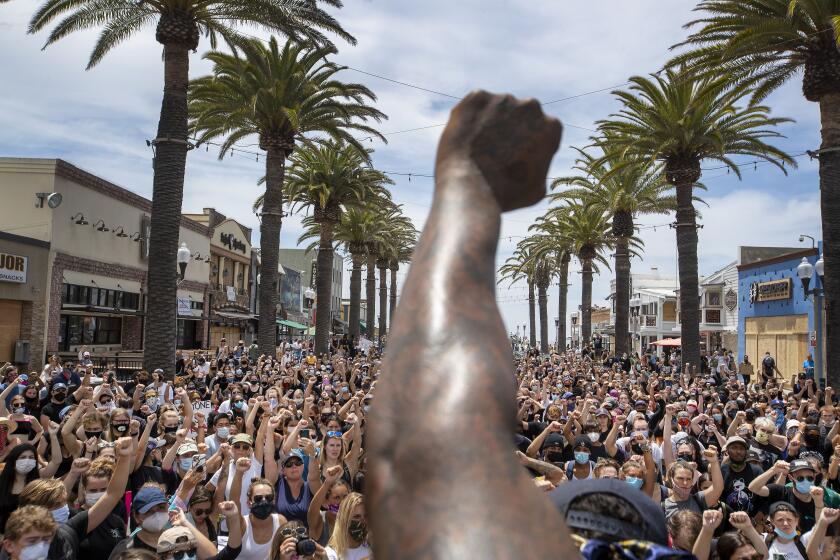Grave injustice becomes fiction in YA from one of the exonerated Central Park Five
- Share via
2021 L.A. Times Festival of Books Preview
Yusef Salaam and Ibi Zoboi
Salaam and Zoboi, whose book is a finalist for the Times Book Prize in young adult literature, will appear April 17 on “Young Adult Fiction: The Black Experience” with fellow finalist Dean Atta and bestselling author and poet Morgan Parker.
RSVP for free at events.latimes.com/festivalofbooks
If you buy books linked on our site, The Times may earn a commission from Bookshop.org, whose fees support independent bookstores.
In 1989, Americans were shocked and horrified by a violent rape in Central Park. Unfortunately, what followed was equally horrifying but ultimately not particularly shocking: The police coerced false confessions from five Black teens, who were questioned without parents or representation. The prosecutors and the media then painted the youths — Yusef Salaam, Raymond Santana, Korey Wise, Kevin Richardson and Antron McCray — as depraved criminals symbolizing society on the brink of chaos. (One real estate mogul, demonstrating that the facts didn’t matter as much as generating attention for himself, loudly called for the death penalty in newspaper ads.)
These days, the Central Park Five, all of whom served extensive prison time, have been rechristened the Exonerated Five after a 2002 confession from the actual rapist enabled the men to clear their names. Their stories were told first in a documentary series and then in Ava DuVernay’s Netflix series “When They See Us.” But the scars never completely faded, and in the midst of the trial of Derek Chauvin over the death of George Floyd, it’s tragically obvious that the treatment of Black men remains a major issue in America.
Now one of the five, Yusef Salaam, an activist and motivational speaker, has teamed with acclaimed YA author Ibi Zoboi to write “Punching the Air,” a novel in verse. The narrator-poet, Amal, is arrested and imprisoned in a fictional city for a crime he did not commit; we see him adjusting, or not, to the juvenile detention center, but we also flash back to the day of the crime and the trial, as well as Amal’s mistreatment at the hands of white teachers in school.
“You can never not be scarred of being falsely accused of a crime,” Salaam says. “I could never not have that outlook on life. What matters now is what I do with my life.”
Ava DuVernay, director of the movies “Selma” and “13th” and co-creator of television’s “Queen Sugar,” has made a docudrama in four parts — one might even say “movements,” for each has its own musical speed and spin — about the Central Park Five.
Salaam and Zoboi met at Hunter College in New York in 1999 and reconnected when Zoboi was on tour for her YA novel “American Street.” They spoke with The Times on video about the process of creating “Punching the Air” and what they hope to evoke with it. The interview has been edited for length and clarity.
How did the book come about?
Salaam: I was going around the country with a suitcase full of books I had self-published. I bumped into Ibi and she said, “What are you doing and why are you doing it this way?” She said I needed to get my story in front of young people with a book.
Zoboi: I wanted to collaborate with Yusef in telling the story of the Central Park Five, and my memory of the incident as a sixth-grader and native New Yorker, in a nonfiction YA book. Yusef was under contract with Ava DuVernay and could not share his story elsewhere, but we were given the green light to tell a fictional story.
What was your collaborative process like?
Salaam: I’m the narrator and Ibi’s the writer.
Zoboi: I said I can take whatever you experienced and learned in hindsight and put it into poetry. The main reason it’s in verse was because the poems in his self-published book were poems he had written as an incarcerated teen. There was one that particularly struck me called “I Stand Accused.” I used it in the first draft. It has a lot of intellect, insight and rage. He had this understanding of social inequity and how it applied to him then. He saw that while it was happening.
The parts where Amal is rapping or reciting poems, he is using Yusef’s actual words. “I Stand Accused” is not in the final book, but it served as the foundation for Amal’s voice and for his journey — how do I express rage with every single word but with intellect and wisdom?
Salaam: I read that poem right before we were sentenced. We shouldn’t have been there in the first place, going to prison for a crime we hadn’t committed. We were violently awakened to what others have called the American Nightmare. You want to fight, but what is the fight? For us, it was about having our voices, standing in the court, saying my rhyme.
We’ve all followed so many Chauvin-like cases that it’s insulting to hear elected officials say, “we are better than this.” No, we are not.
Was it challenging to write a novel in verse?
Zoboi: It was the perfect structure for this story — it would have been challenging to write it in prose. I had gaps in my own understanding of the true psychological and emotional journey of a boy falsely accused of a crime, and of some of the details. I’d ask Yusef, but I didn’t want to dig too deep into painful memories. Yusef looks back on the bigger picture and deeper meaning, rather than the details. I did other research for those details, but I did not get the full picture in my mind. Poetry allowed me to address those gaps.
The book is a sophisticated and difficult read even for adults. How did you calibrate it for a YA audience?
Zoboi: I don’t write the way a 16-year-old will write, I write in a way a 16-year-old will think, even if they don’t have the right words. I’m interpreting their emotional journey for them in a way that is accessible. Having Yusef’s words as a foundation really helped.
How much is the book emotionally autobiographical for each of you?
Zoboi: I didn’t experience what Yusef experienced, but we were both children in 1980s New York City and we weren’t able to accurately assess what was going on. With all these documentaries now about the crack epidemic, the killing of Yusuf Hawkins and others, we realize now how traumatizing that was for a child absorbing all that news. And as an immigrant in school, I felt hyper-visible and invisible at the same time, which Amal feels.
Salaam: We’ve reached into the soul of what it meant to be a young person of color and pulled those emotions into the present day. We experience all the systems of oppression but don’t always get a chance to talk about it.
Yusef, when you stood before the judge and read “I Stand Accused,” it was almost self-destructive given that he was about to sentence you, yet it was also astonishingly honest and brave. Amal’s behavior often reflects both of those impulses. What do you hope teens will take away from this?
Salaam: You have to find the courage to stand up and say, “This is not going to define me.” They have a place for me — the prison industrial complex is the modern-day cotton field. The system is trying to get me to accept its definition of me, but the true definition of me is greater than what they want me to be. You’re born with a purpose and you will find that.
Walter Mosley, Luis Rodriguez, the coiner of #BlackLivesMatter and others sketch a hopeful future for L.A. and the U.S. after George Floyd protests.
More to Read
Sign up for our Book Club newsletter
Get the latest news, events and more from the Los Angeles Times Book Club, and help us get L.A. reading and talking.
You may occasionally receive promotional content from the Los Angeles Times.










